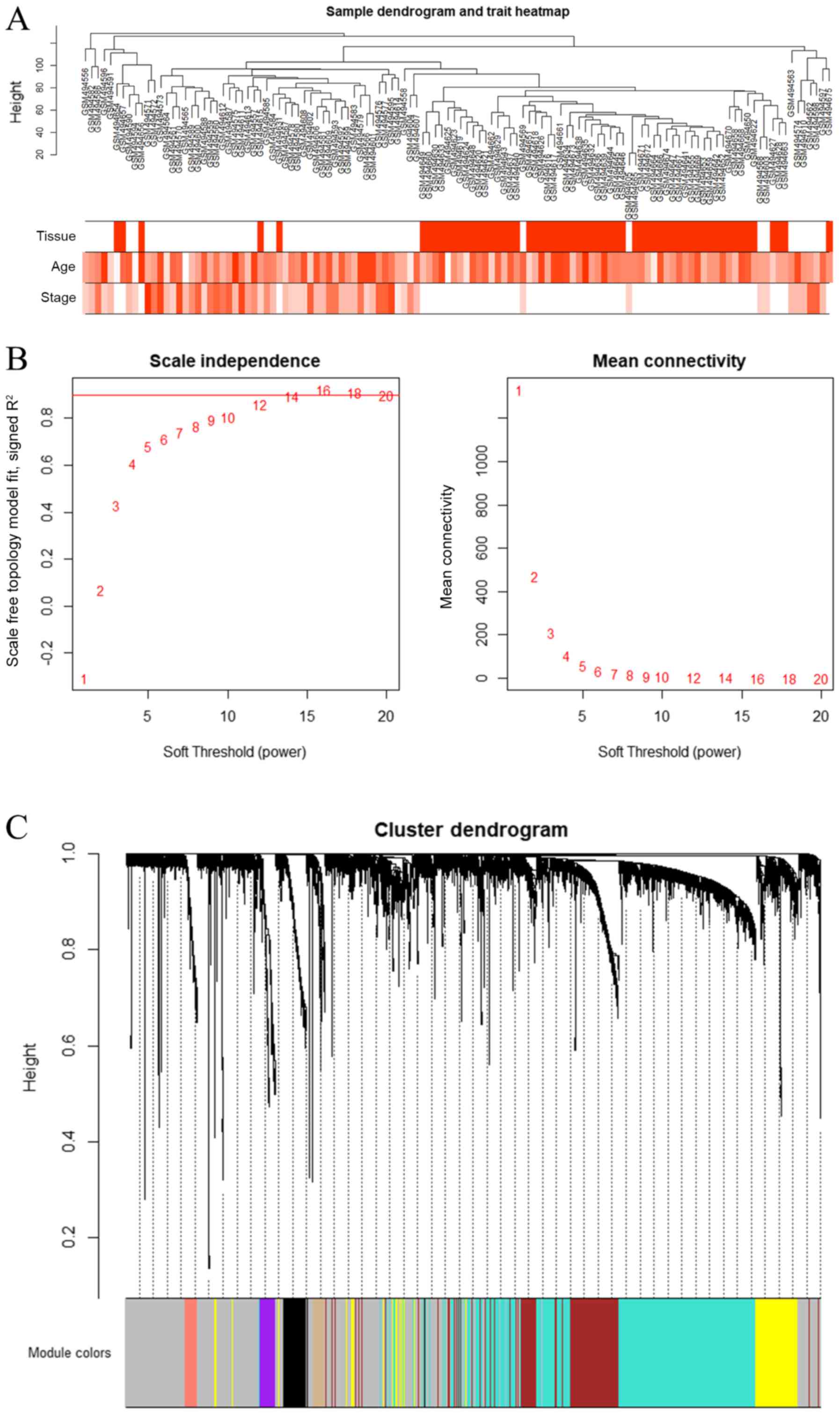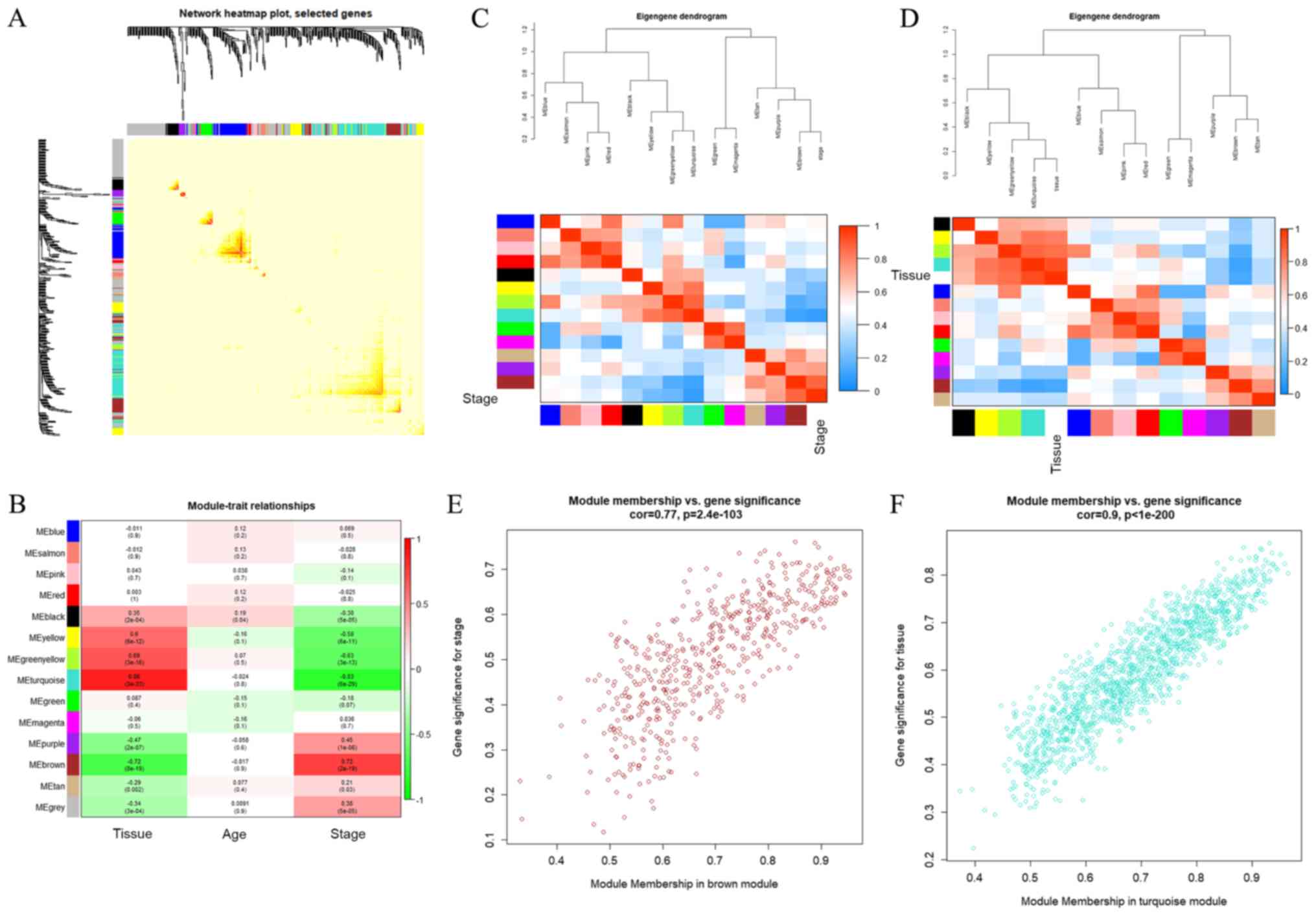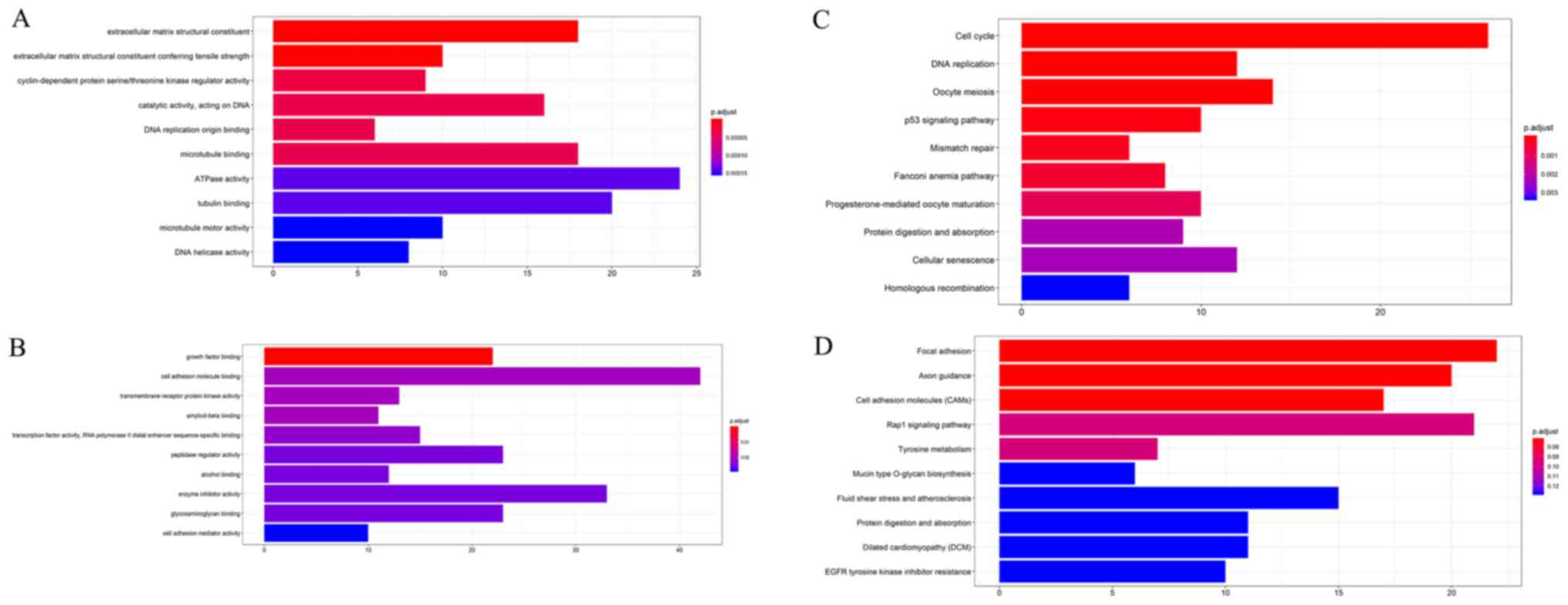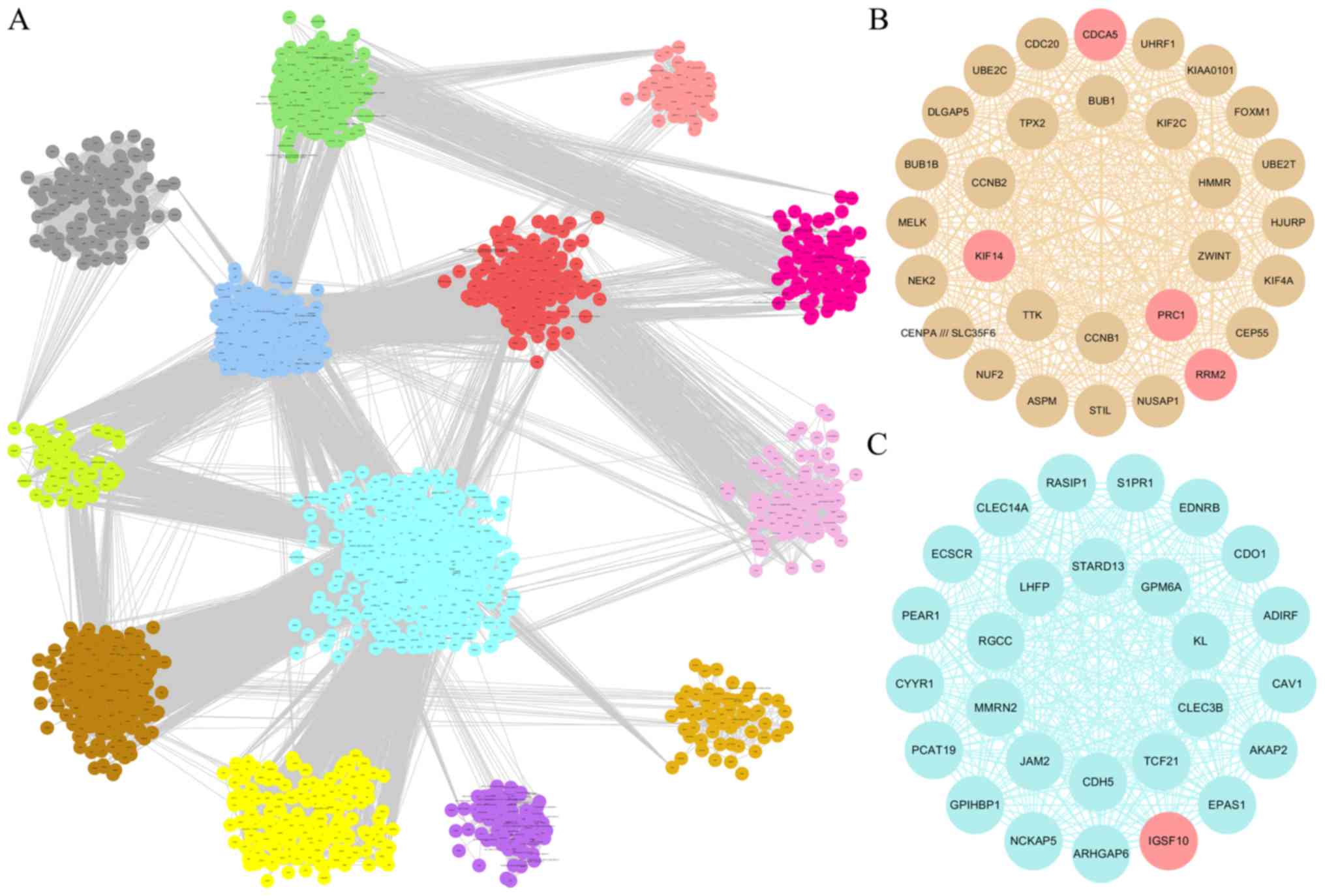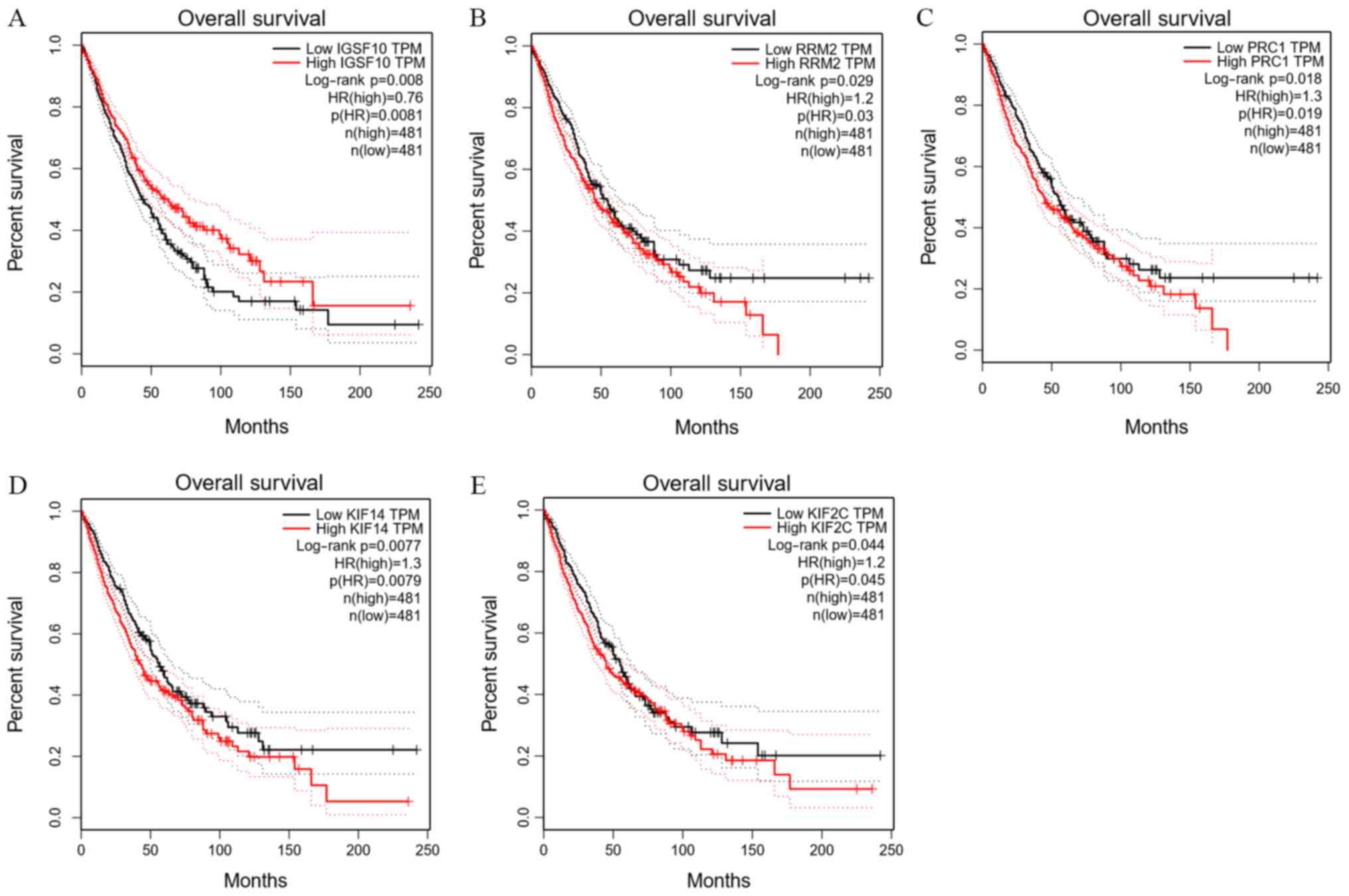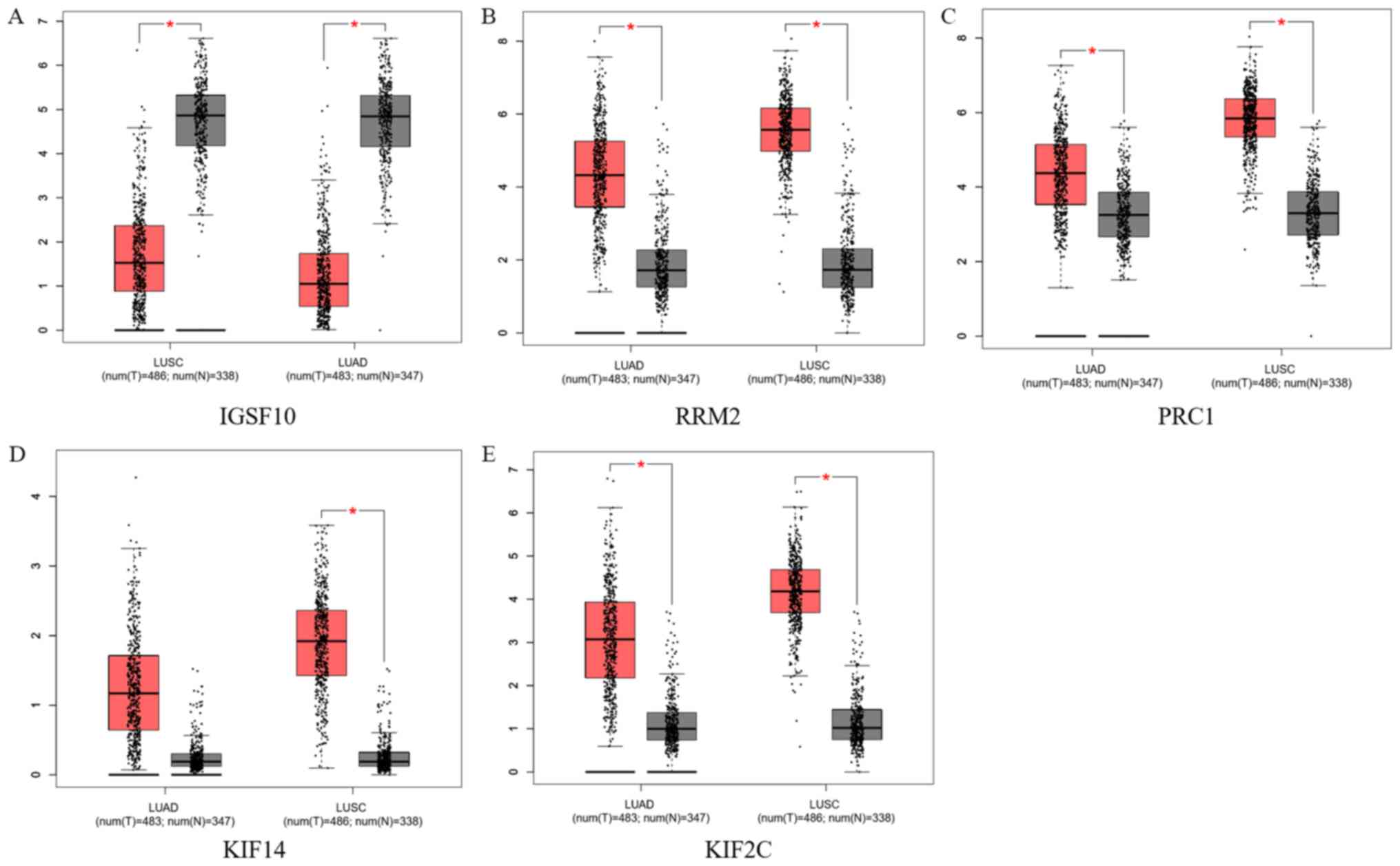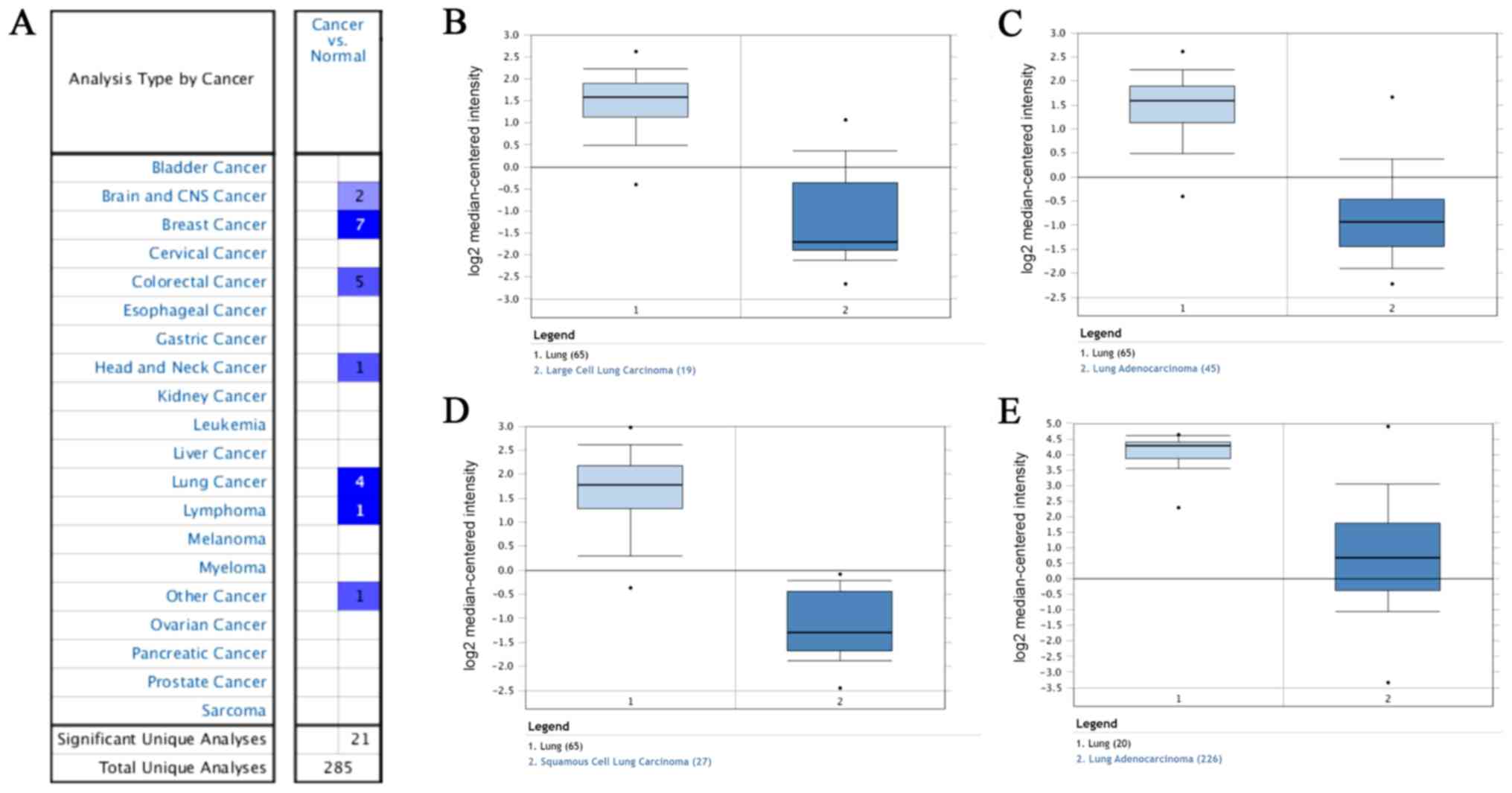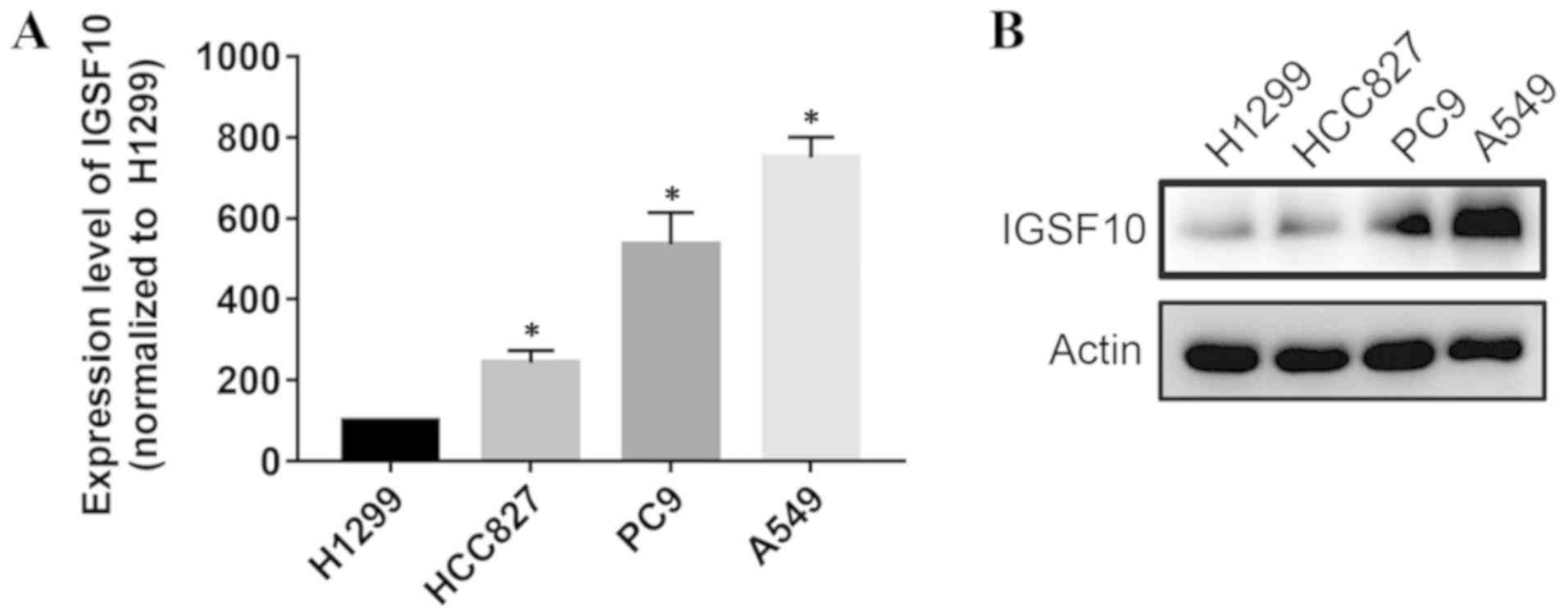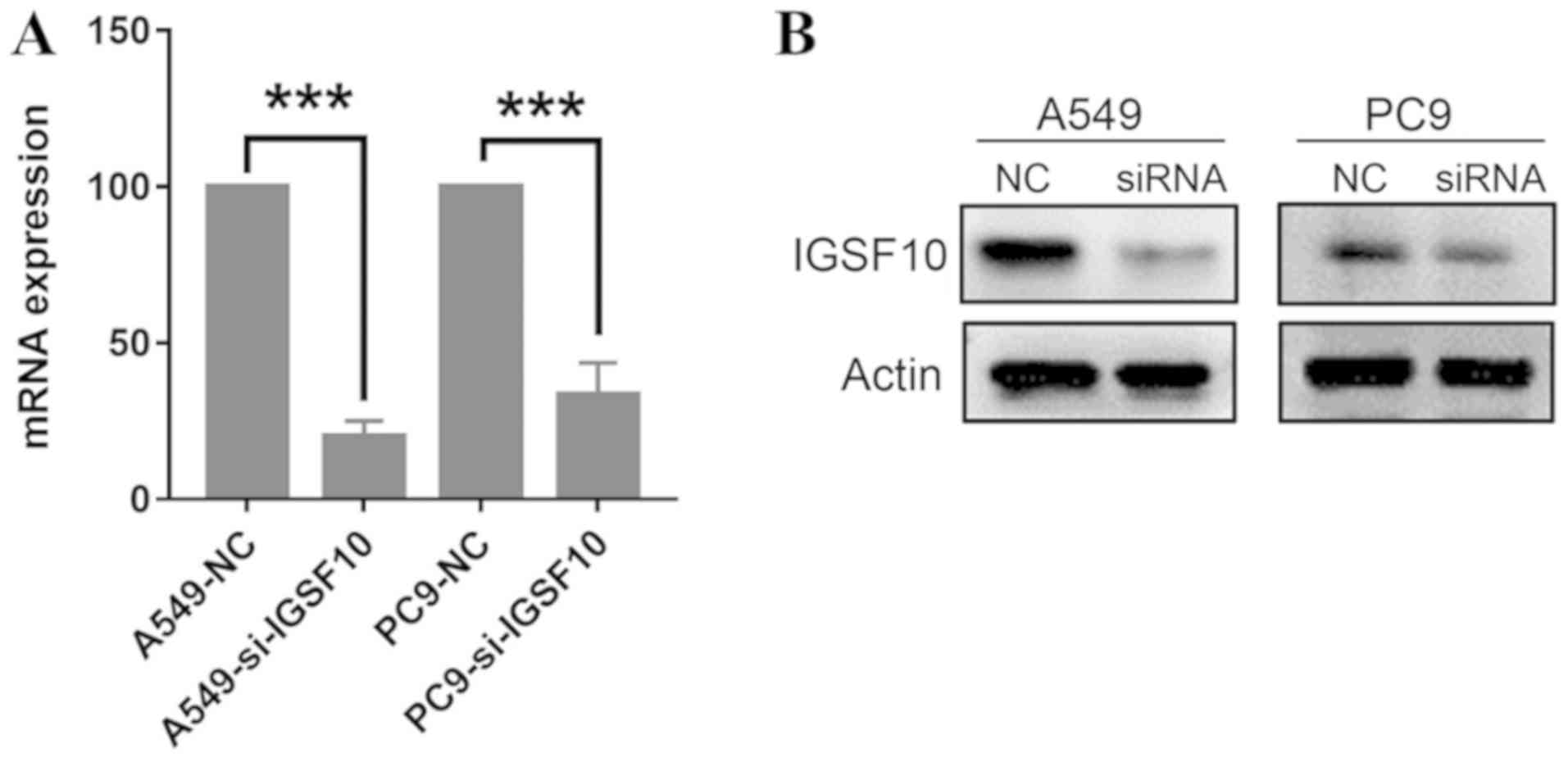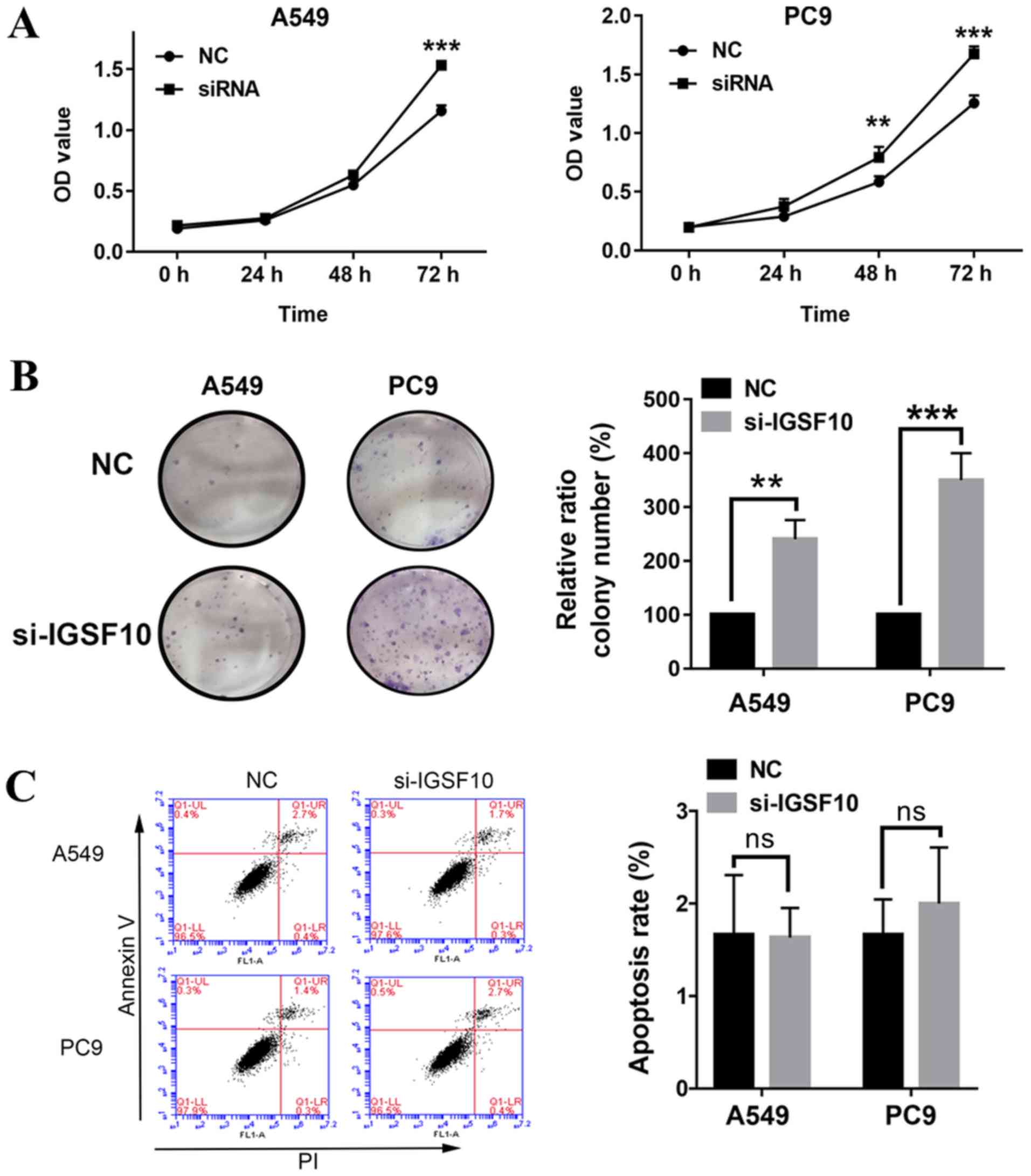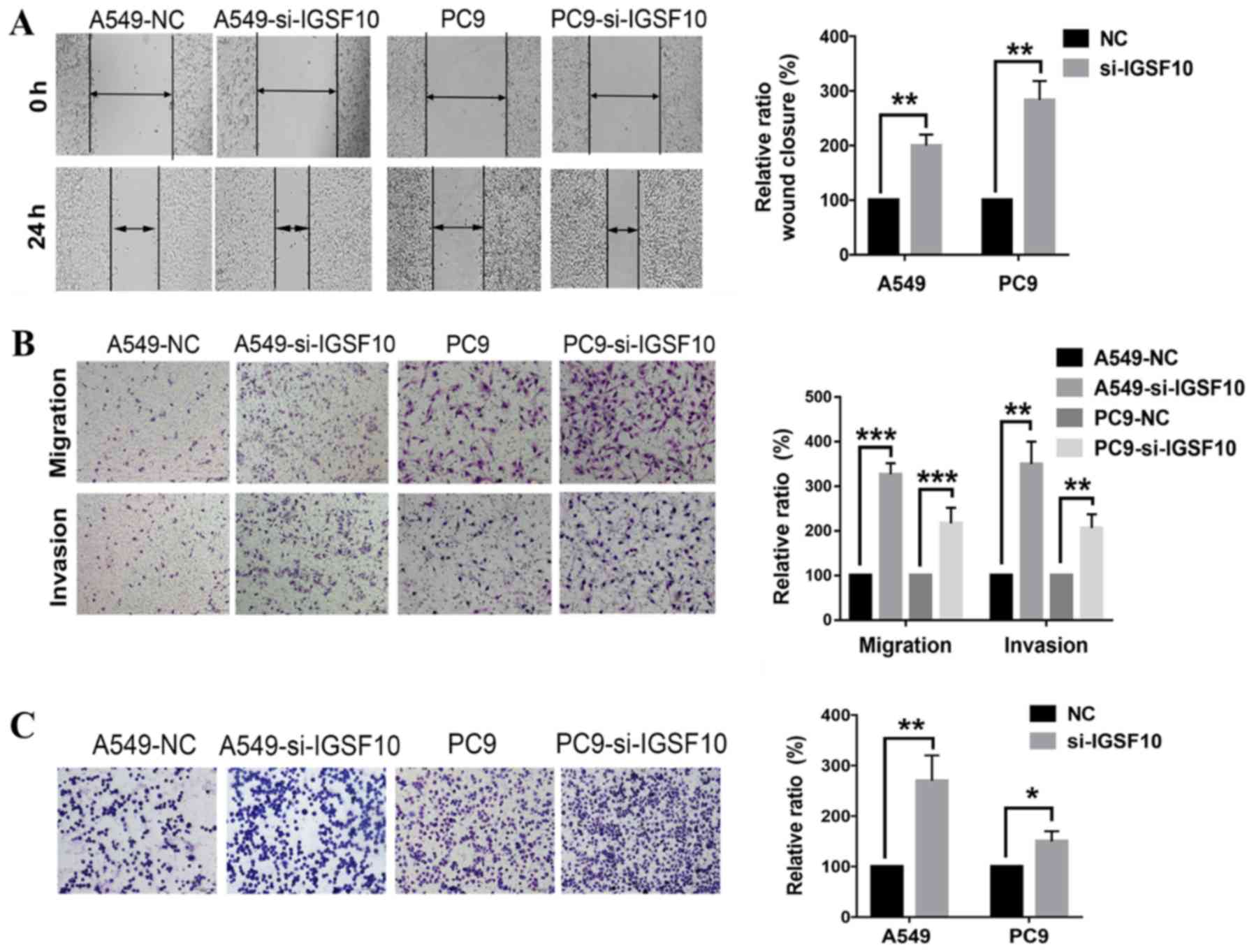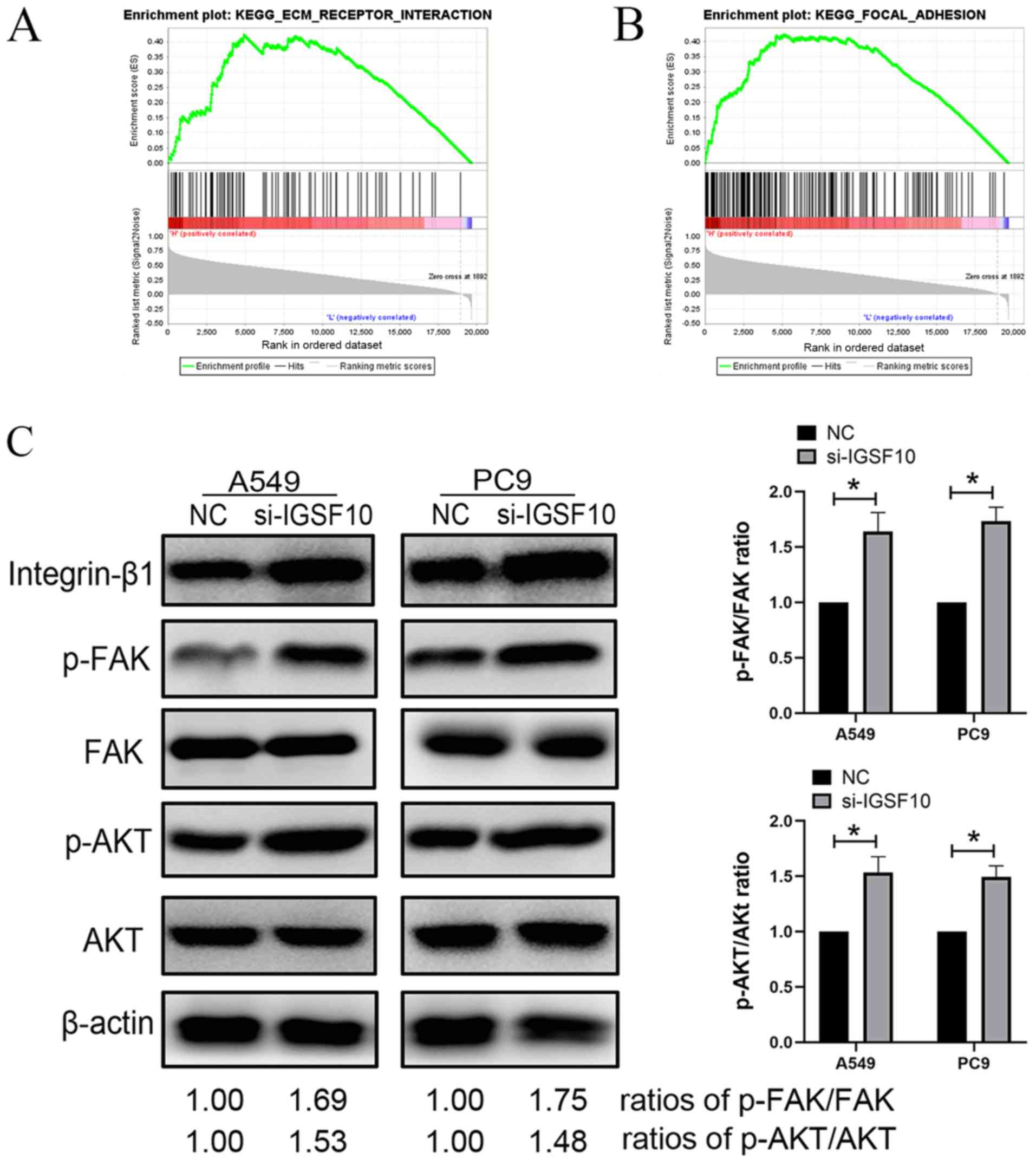|
1
|
Yang D, Dai R, Zhang Q and Fang P:
Apatinib for heavily treated patients with non-small cell lung
cancer: Report of a case series and literature review. Saudi J Biol
Sci. 25:888–894. 2018. View Article : Google Scholar : PubMed/NCBI
|
|
2
|
Gobbi G, Donati B, Do Valle IF, Reggiani
F, Torricelli F, Remondini D, Castellani G, Ambrosetti DC,
Ciarrocchi A and Sancisi V: The Hippo pathway modulates resistance
to BET proteins inhibitors in lung cancer cells. Oncogene.
38:6801–6817. 2019. View Article : Google Scholar : PubMed/NCBI
|
|
3
|
Pan J: Dabrafenib Plus Trametinib for BRAF
V600E-Mutant Non-small Cell Lung Cancer: A Patient Case Report.
Clin Drug Investig. 39:1003–1007. 2019. View Article : Google Scholar : PubMed/NCBI
|
|
4
|
Liu Y, Xiong ZC, Sun X, Sun L, Zhang SL,
Ma JT and Han CB: Impact of apatinib in combination with
osimertinib on EGFR T790M-positive lung adenocarcinoma. Transl
Cancer Res. 8:2151–2163. 2019. View Article : Google Scholar
|
|
5
|
Ito T, Kumagai Y, Itano K, Maruyama T,
Tamura K, Kawasaki S, Suzuki T and Murakami Y: Mathematical
analysis of gefitinib resistance of lung adenocarcinoma caused by
MET amplification. Biochem Biophys Res Commun. 511:544–550. 2019.
View Article : Google Scholar : PubMed/NCBI
|
|
6
|
Nelson AW, Schrock AB, Pavlick DC, Ali SM,
Atkinson EC and Chachoua A: Novel SPECC1L-MET Fusion Detected in
Circulating Tumor DNA in a Patient with Lung Adenocarcinoma
following Treatment with Erlotinib and Osimertinib. J Thorac Oncol.
14:e27–e29. 2019. View Article : Google Scholar
|
|
7
|
Nakasuka T, Ichihara E, Makimoto G, Maeda
Y and Kiura K: Primary Resistance to Alectinib Was Lost after
Bevacizumab Combined Chemotherapy in ALK-Rearranged Lung
Adenocarcinoma. J Thorac Oncol. 14:e168-e1692019. View Article : Google Scholar : PubMed/NCBI
|
|
8
|
Wu K, Li J, Qi Y, Zhang C, Zhu D, Liu D
and Zhao S: SNHG14 confers gefitinib resistance in non-small cell
lung cancer by up-regulating ABCB1 via sponging miR-206-3p. Biomed
Pharmacother. 116:1089952019. View Article : Google Scholar : PubMed/NCBI
|
|
9
|
Gu Y, Zhu X, Cao B, Wu X, Tong X, Shao YW
and Liang L: Transformation to small cell lung cancer and
activation of KRAS during long-term erlotinib maintenance in a
patient with non-small cell lung cancer: A case report. Oncol Lett.
17:5219–5223. 2019.PubMed/NCBI
|
|
10
|
Saito H, Fukuhara T, Furuya N, Watanabe K,
Sugawara S, Iwasawa S, Tsunezuka Y, Yamaguchi O, Okada M, Yoshimori
K, et al: Erlotinib plus bevacizumab versus erlotinib alone in
patients with EGFR-positive advanced non-squamous non-small-cell
lung cancer (NEJ026): Interim analysis of an open-label,
randomised, multicentre, phase 3 trial. Lancet Oncol. 20:625–635.
2019. View Article : Google Scholar : PubMed/NCBI
|
|
11
|
Wang J, Sheng Z and Cai Y: Effects of
microRNA-513b on cell proliferation, apoptosis, invasion, and
migration by targeting HMGB3 through regulation of mTOR signaling
pathway in non-small-cell lung cancer. J Cell Physiol.
234:10934–10941. 2019. View Article : Google Scholar : PubMed/NCBI
|
|
12
|
Qiu BQ, Zhang PF, Xiong D, Xu JJ, Long X,
Zhu SQ, Ye XD, Wu Y, Pei X, Zhang XM and Wu YB: CircRNA fibroblast
growth factor receptor 3 promotes tumor progression in non-small
cell lung cancer by regulating Galectin-1-AKT/ERK1/2 signaling. J
Cell Physiol. 234:11256–11264. 2019. View Article : Google Scholar
|
|
13
|
Braicu C, Zimta A-A, Harangus A, Iurca I,
Irimie A, Coza O and Berindan-Neagoe I: The function of non-coding
RNAs in lung cancer tumorigenesis. Cancers (Basel). 11:6052019.
View Article : Google Scholar
|
|
14
|
Lukas TJ, Mirzoeva S, Slomczynska U and
Watterson DM: Identification of novel classes of protein kinase
inhibitors using combinatorial peptide chemistry based on
functional genomics knowledge. J Med Chem. 42:910–919. 1999.
View Article : Google Scholar : PubMed/NCBI
|
|
15
|
Kellner U, Steinert R, Seibert V, Heim S,
Kellner A, Schulz HU, Roessner A, Krüger S and Reymond M:
Epithelial cell preparation for proteomic and transcriptomic
analysis in human pancreatic tissue. Pathol Res Pract. 200:155–163.
2004. View Article : Google Scholar : PubMed/NCBI
|
|
16
|
Baylin SB and Jones PA: A decade of
exploring the cancer epigenome - biological and translational
implications. Nat Rev Cancer. 11:726–734. 2011. View Article : Google Scholar : PubMed/NCBI
|
|
17
|
Zhang C, Peng L, Zhang Y, Liu Z, Li W,
Chen S and Li G: The identification of key genes and pathways in
hepatocellular carcinoma by bioinformatics analysis of
high-throughput data. Med Oncol. 34:1012017. View Article : Google Scholar : PubMed/NCBI
|
|
18
|
Lu X, Lu J, Liao B, Li X, Qian X and Li K:
Driver pattern identification over the gene co-expression of drug
response in ovarian cancer by integrating high throughput genomics
data. Sci Rep. 7:161882017. View Article : Google Scholar : PubMed/NCBI
|
|
19
|
Busch R, Qiu W, Lasky-Su J, Morrow J,
Criner G and DeMeo D: Differential DNA methylation marks and gene
comethylation of COPD in African-Americans with COPD exacerbations.
Respir Res. 17:1432016. View Article : Google Scholar : PubMed/NCBI
|
|
20
|
Pei G, Chen L and Zhang W: WGCNA
application to proteomic and metabolomic data analysis. In. Methods
in enzymology. 585. Elsevier; pp. 135–158. 2017, View Article : Google Scholar
|
|
21
|
Langfelder P and Horvath S: WGCNA: An R
package for weighted correlation network analysis. BMC
Bioinformatics. 9:5592008. View Article : Google Scholar : PubMed/NCBI
|
|
22
|
Sun Q, Zhang W, Wang L, Guo F, Song D,
Zhang Q, Zhang D, Fan Y and Wang J: Hypermethylated CD36 gene
affected the progression of lung cancer. Gene. 678:395–406. 2018.
View Article : Google Scholar : PubMed/NCBI
|
|
23
|
An Y, Zhang Q, Li X, Wang Z, Li Y and Tang
X: Upregulated microRNA miR-21 promotes the progression of lung
adenocarcinoma through inhibition of KIBRA and the Hippo signaling
pathway. Biomed Pharmacother. 108:1845–1855. 2018. View Article : Google Scholar : PubMed/NCBI
|
|
24
|
Lu TP, Tsai MH, Lee JM, Hsu CP, Chen PC,
Lin CW, Shih JY, Yang PC, Hsiao CK, Lai LC, et al: Identification
of a novel biomarker, SEMA5A, for non-small cell lung carcinoma in
nonsmoking women. Cancer Epidemiol Biomarkers Prev. 19:2590–2597.
2010. View Article : Google Scholar : PubMed/NCBI
|
|
25
|
He J, Hu Y, Hu M and Li B: Development of
PD-1/PD-L1 Pathway in Tumor Immune Microenvironment and Treatment
for Non-Small Cell Lung Cancer. Sci Rep. 5:131102015. View Article : Google Scholar : PubMed/NCBI
|
|
26
|
Nakamura H, Ando K, Shinmyo T, Morita K,
Mochizuki A, Kurimoto N and Tatsunami S: Female gender is an
independent prognostic factor in non-small-cell lung cancer: A
meta-analysis. Ann Thorac Cardiovasc Surg. 17:469–480. 2011.
View Article : Google Scholar : PubMed/NCBI
|
|
27
|
Matsuo K, Ito H, Yatabe Y, Hiraki A,
Hirose K, Wakai K, Kosaka T, Suzuki T, Tajima K and Mitsudomi T:
Risk factors differ for non-small-cell lung cancers with and
without EGFR mutation: Assessment of smoking and sex by a
case-control study in Japanese. Cancer Sci. 98:96–101. 2007.
View Article : Google Scholar
|
|
28
|
Tang Z, Li C, Kang B, Gao G, Li C and
Zhang Z: GEPIA: A web server for cancer and normal gene expression
profiling and interactive analyses. Nucleic Acids Res. 45(W1):
W98–W102. 2017. View Article : Google Scholar : PubMed/NCBI
|
|
29
|
Hou J, Aerts J, den Hamer B, van Ijcken W,
den Bakker M, Riegman P, van der Leest C, van der Spek P, Foekens
JA, Hoogsteden HC, et al: Gene expression-based classification of
non-small cell lung carcinomas and survival prediction. PLoS One.
5:e103122010. View Article : Google Scholar : PubMed/NCBI
|
|
30
|
Okayama H, Kohno T, Ishii Y, Shimada Y,
Shiraishi K, Iwakawa R, Furuta K, Tsuta K, Shibata T, Yamamoto S,
et al: Identification of genes upregulated in ALK-positive and
EGFR/KRAS/ALK-negative lung adenocarcinomas. Cancer Res.
72:100–111. 2012. View Article : Google Scholar
|
|
31
|
Welinder C and Ekblad L: Coomassie
staining as loading control in Western blot analysis. J Proteome
Res. 10:1416–1419. 2011. View Article : Google Scholar
|
|
32
|
Dunning K and Safo AO: The ultimate
Wright-Giemsa stain: 60 years in the making. Biotech Histochem.
86:69–75. 2011. View Article : Google Scholar : PubMed/NCBI
|
|
33
|
Zhu W, Chen X, Ning L and Jin K: Network
Analysis Reveals TNF as a Major Hub of Reactive Inflammation
Following Spinal Cord Injury. Sci Rep. 9:9282019. View Article : Google Scholar : PubMed/NCBI
|
|
34
|
Cooper J and Giancotti FG: Integrin
Signaling in Cancer: Mechanotransduction, Stemness, Epithelial
Plasticity, and Therapeutic Resistance. Cancer Cell. 35:347–367.
2019. View Article : Google Scholar : PubMed/NCBI
|
|
35
|
Hamidi H and Ivaska J: Every step of the
way: Integrins in cancer progression and metastasis. Nat Rev
Cancer. 18:533–548. 2018. View Article : Google Scholar : PubMed/NCBI
|
|
36
|
Scarpa A, Sikora K, Fassan M, Rachiglio
AM, Cappellesso R, Antonello D, Amato E, Mafficini A, Lambiase M,
Esposito C, et al: Molecular typing of lung adenocarcinoma on
cytological samples using a multigene next generation sequencing
panel. PLoS One. 8:e804782013. View Article : Google Scholar : PubMed/NCBI
|
|
37
|
Tessema M, Yingling CM, Liu Y, Tellez CS,
Van Neste L, Baylin SS and Belinsky SA: Genome-wide unmasking of
epigenetically silenced genes in lung adenocarcinoma from smokers
and never smokers. Carcinogenesis. 35:1248–1257. 2014. View Article : Google Scholar : PubMed/NCBI
|
|
38
|
Hamidaddin MA, AlRabiah H and Darwish IA:
Development and comparative evaluation of two immunoassay platforms
for bioanalysis of crizotinib: A potent drug used for the treatment
of non-small cell lung cancer. Talanta. 201:217–225. 2019.
View Article : Google Scholar : PubMed/NCBI
|
|
39
|
Heidel JD, Liu JY, Yen Y, Zhou B, Heale
BS, Rossi JJ, Bartlett DW and Davis ME: Potent siRNA inhibitors of
ribonucleotide reductase subunit RRM2 reduce cell proliferation in
vitro and in vivo. Clin Cancer Res. 13:2207–2215. 2007. View Article : Google Scholar : PubMed/NCBI
|
|
40
|
Duxbury MS and Whang EE: RRM2 induces
NF-kappaB-dependent MMP-9 activation and enhances cellular
invasiveness. Biochem Biophys Res Commun. 354:190–196. 2007.
View Article : Google Scholar : PubMed/NCBI
|
|
41
|
Lundin D, Berggren G, Logan DT and Sjöberg
BM: The origin and evolution of ribonucleotide reduction. Life
(Basel). 5:604–636. 2015.
|
|
42
|
Li Y, Wang Z, Tang L, Hu R, Huang L and
Ding J: RRM2 overexpression in glioblastoma enhances the
proliferation and invasion of cancer cells. Int J Clin Exp Pathol.
9:11623–11630. 2016.
|
|
43
|
Chen WX, Yang LG, Xu LY, Cheng L, Qian Q,
Sun L and Zhu YL: Bioinformatics analysis revealing prognostic
significance of RRM2 gene in breast cancer. Biosci Rep.
39:392019.
|
|
44
|
Federico A, Sepe R, Cozzolino F, Piccolo
C, Iannone C, Iacobucci I, Pucci P, Monti M and Fusco A: The
complex CBX7-PRMT1 has a critical role in regulating E-cadherin
gene expression and cell migration. Biochim Biophys Acta Gene Regul
Mech. 1862:509–521. 2019. View Article : Google Scholar : PubMed/NCBI
|
|
45
|
Yu F, Zhou C, Zeng H, Liu Y and Li S: BMI1
activates WNT signaling in colon cancer by negatively regulating
the WNT antagonist IDAX. Biochem Biophys Res Commun. 496:468–474.
2018. View Article : Google Scholar : PubMed/NCBI
|
|
46
|
Ramaiah MJ and Vaishnave S: BMI1 and PTEN
are key determinants of breast cancer therapy A plausible
therapeutic target in breast cancer. Gene. 678:302–311. 2018.
View Article : Google Scholar
|
|
47
|
Zhan P, Zhang B, Xi GM, Wu Y, Liu HB, Liu
YF, Xu WJ, Zhu QQ, Cai F, Zhou ZJ, et al: PRC1 contributes to
tumorigenesis of lung adenocarcinoma in association with the
Wnt/β-catenin signaling pathway. Mol Cancer. 16:1082017. View Article : Google Scholar
|
|
48
|
Chen J, Rajasekaran M, Xia H, Zhang X,
Kong SN, Sekar K, Seshachalam VP, Deivasigamani A, Goh BK, Ooi LL,
et al: The microtubule-associated protein PRC1 promotes early
recurrence of hepatocellular carcinoma in association with the
Wnt/β-catenin signalling pathway. Gut. 65:1522–1534. 2016.
View Article : Google Scholar : PubMed/NCBI
|
|
49
|
Tang H, Xiao G, Behrens C, Schiller J,
Allen J, Chow CW, Suraokar M, Corvalan A, Mao J, White MA, et al: A
12-gene set predicts survival benefits from adjuvant chemotherapy
in non-small cell lung cancer patients. Clin Cancer Res.
19:1577–1586. 2013. View Article : Google Scholar : PubMed/NCBI
|
|
50
|
Hung PF, Hong TM, Hsu YC, Chen HY, Chang
YL, Wu CT, Chang GC, Jou YS, Pan SH and Yang PC: The motor protein
KIF14 inhibits tumor growth and cancer metastasis in lung
adenocarcinoma. PLoS One. 8:e616642013. View Article : Google Scholar : PubMed/NCBI
|
|
51
|
Corson TW, Zhu CQ, Lau SK, Shepherd FA,
Tsao MS and Gallie BL: KIF14 messenger RNA expression is
independently prognostic for outcome in lung cancer. Clin Cancer
Res. 13:3229–3234. 2007. View Article : Google Scholar : PubMed/NCBI
|
|
52
|
Bai Y, Xiong L, Zhu M, Yang Z, Zhao J and
Tang H: Co-expression network analysis identified KIF2C in
association with progression and prognosis in lung adenocarcinoma.
Cancer Biomark. 24:371–382. 2019. View Article : Google Scholar : PubMed/NCBI
|
|
53
|
Song YJ, Tan J, Gao XH and Wang LX:
Integrated analysis reveals key genes with prognostic value in lung
adenocarcinoma. Cancer Manag Res. 10:6097–6108. 2018. View Article : Google Scholar : PubMed/NCBI
|
|
54
|
Daino K, Ugolin N, Altmeyer-Morel S,
Guilly MN and Chevillard S: Gene expression profiling of
alpha-radiation-induced rat osteosarcomas: Identification of
dysregulated genes involved in radiation-induced tumorigenesis of
bone. Int J Cancer. 125:612–620. 2009. View Article : Google Scholar : PubMed/NCBI
|
|
55
|
Thutkawkorapin J, Picelli S, Kontham V,
Liu T, Nilsson D and Lindblom A: Exome sequencing in one family
with gastric- and rectal cancer. BMC Genet. 17:412016. View Article : Google Scholar : PubMed/NCBI
|
|
56
|
Zhao G, Gong L, Su D, Jin Y, Guo C, Yue M,
Yao S, Qin Z, Ye Y, Tang Y, et al: Cullin5 deficiency promotes
small-cell lung cancer metastasis by stabilizing integrin β1. J
Clin Invest. 129:972–987. 2019. View Article : Google Scholar : PubMed/NCBI
|
|
57
|
Boudria A, Abou Faycal C, Jia T, Gout S,
Keramidas M, Didier C, Lemaître N, Manet S, Coll JL, Toffart AC, et
al: VEGF165b, a splice variant of VEGF-A, promotes lung tumor
progression and escape from anti-angiogenic therapies through a β1
integrin/VEGFR autocrine loop. Oncogene. 38:1050–1066. 2019.
View Article : Google Scholar
|
|
58
|
Mitra SK, Hanson DA and Schlaepfer DD:
Focal adhesion kinase: In command and control of cell motility. Nat
Rev Mol Cell Biol. 6:56–68. 2005. View Article : Google Scholar : PubMed/NCBI
|
|
59
|
Hayashi I, Vuori K and Liddington RC: The
focal adhesion targeting (FAT) region of focal adhesion kinase is a
four-helix bundle that binds paxillin. Nat Struct Biol. 9:101–106.
2002. View
Article : Google Scholar : PubMed/NCBI
|















